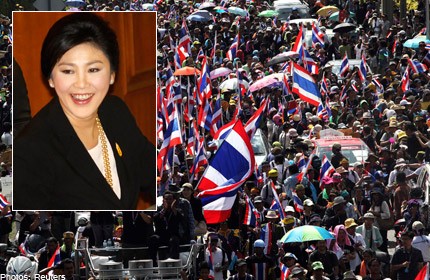Thai PM vows to meet protesters with pacifism

BANGKOK - Thai opposition protesters have met virtually no resistance while storming ministries and setting up camp in key government buildings, as the prime minister appears determined to snuff the oxygen from rallies aimed at ousting her from power.
With a readily-assembled kit of stages and food stalls, the anti-government protesters have quickly dug-in at the buildings under their occupation, while continuing to besiege more key targets.
In an unprecedentedly brazen move Friday protesters forced their way into the army's headquarters briefly, the latest in a string of provocative acts by groups bent on ousting Prime Minister Yingluck Shinawatra and ridding the country of the influence of her divisive brother Thaksin.
The demonstrations are the biggest rallies to rock the Thai capital since mass 2010 street action by the pro-Thaksin "Red Shirts" that ended in the country's worst political bloodshed for decades.
They are also the greatest threat yet faced by Yingluck, who defended her soft-touch approach on Saturday.
"We have chosen to be considered as a weak government by not using force," she told reporters at a briefing at police headquarters in the capital.
"I don't want to see a nightmare situation, so we have decided to let unarmed police oversee the situation," she added.
The police force is far from visible in Bangkok, except around the barbed wire-barricaded Government House, which protesters have set as a key target for Sunday as they aim to declare it their "day of victory".
Dozens of soldiers have been deployed to Government House to boost security, but General Niphat Thonglek, defence ministry permanent secretary, said they would be "unarmed".
"The government doesn't want to react violently. It is exactly what the protesters want. They want a violent reaction from the government so that they can get sympathy and support," said Thailand expert Andrew Walker, a professor at Australian National University.
Thousands of anti-government protesters are scattered in pockets across the city, diluting their demos but adding to their potential unpredictability.
Rabble-rousing protest leader Suthep Thaugsuban has tried to raise the temperature with claims of assassination plots against him during nightly stage shows in front of thousands of supporters - a mainly middle-aged crowd of Bangkok urbanites, royalists and southerners.
The former deputy prime minister for a previous government, who resigned from the opposition Democrat Party to lead the demos, also has a warrant out for his arrest over the ministry occupation.
Bangkok, a city of some 12 million people well-used to playing host to the street incarnations of the country's turbulent politics, has largely continued with normal life during the month-long protests, even after they escalated with the foreign ministry occupation on Monday.
It is a far cry from the Red Shirt's 2010 protests, which brought parts of the Thai capital to a standstill before a military crackdown that left 90 people dead.
But the extremely strong emotions that Thaksin engenders and the sheer numbers of people on the streets mean the threat of violence is ever-present. So far the Red Shirts, who are also protesting in the capital in a bid to protect the government, have confined themselves to a stadium in Bangkok, but there is potential for a spark between the rivals.
"With this number of people around, you only need one nasty piece of violence and this could spin away," said Thailand expert Chris Baker, co-author of a biography of Thaksin.
"You only need one little incident, it could happen anytime."
So far the government has not deviated from its approach, barely trying to defend affected buildings, with the exception of key security offices such as the interior ministry and police headquarters.
But this strategy could backfire, according to experts, who point to Thailand's troubled history with damaging extended protests, like the arch royalist anti-Thaksin "Yellow Shirt" occupation of Bangkok's airports in 2008.
"The government has made a big mistake," said Michael Montesano at the Institute of Southeast Asian Studies in Singapore.
"Once buildings are occupied, it is very hard to get the occupiers out. This was one of the lessons of 2008."
It could however, simply be a waiting game as the country prepares to celebrate the 86th birthday of revered King Bhumibol Adulyadej on December 5.
The date is normally marked in a manner of respect and adulation and the protesters, who profess deep adoration of the country's monarch, have said they will end their rally before the anniversary.